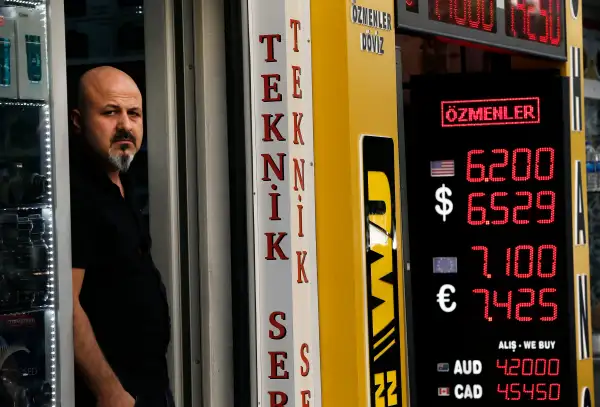Turkey's Economy Is In Crisis. Here's How That Could Affect Your Investments
Money is not a client of any investment adviser featured on this page. The information provided on this page is for educational purposes only and is not intended as investment advice. Money does not offer advisory services.

The last thing 401(k) investors need is another thing to worry about. But to look at the headlines, Turkey's currency crisis -- which has spurred concerns of a financial "contagion" -- seems like just that.
After declining gradually all year, the Turkish lira entered free-fall Monday after President Donald Trump announced the U.S. would institute tariffs on Turkish steel and aluminum. It’s considered a retaliatory move, since Turkey declined to release an American pastor who has been held on charges related to terrorism. Following an initial 11% plunge, the lira recovered somewhat on Tuesday and Wednesday, but remains down about 40% on the dollar for the year.
The crisis has spawned some pretty scary looking news coverage.
While the tariffs may have served as an impetus for the crash, Turkey had built up a huge pile of debt for years as President Recep Tayyip Erdogan pushed large construction projects across the country and refrained from raising interest rates. It left Turkey – and the countries linked to the debt – at risk, driving fears of a greater crisis.
Here’s how it could play out in your investment portfolio.
Turkey could be a sign of emerging market struggles
It's unlikely Turkey plays a big role in your retirement portfolio, at least directly. Turkish stocks represent less than 1% of the Vanguard FTSE Emerging Market ETF’s (VWO), for instance. And for most investors, even a broad-based emerging market fund like Vanguard's should only represent a sliver of your overall stock holdings. But the lira’s decline has served as a wake up call for investors in other developing markets, many of which have heavy debt loads, much like Turkey's. Following the lira’s fall, currencies in South Africa, India, Mexico, Argentina and Indonesia all dropped as well, even though there’s very little economic link to Turkey.
Here's why investors are worried: In the wake of the financial crisis, the Federal Reserve labored to help U.S. businesses by flooding the global economy with dollars, making it easier for American businesses to borrow and invest. U.S. businesses weren't the only ones to take advantage of the Fed's largess, however. The glut of U.S. dollars also weakened the value of the U.S. dollar relative many foreign currencies, making it cheaper for developing nations to borrow dollars well. These debts reached nearly $2.5 trillion during the first quarter, according to the Bank for International Settlements.
The problem is, now the U.S. economy is humming along and instead of loosening the supply of U.S. dollars, the Fed is tightening. The dollar is now getting stronger against many foreign currencies, and emerging nations' dollar-denominated debts are getting harder to pay back. In other words, some are concerned Turkey’s troubles are a sign of what's to come in other markets, which has lead to panic selling. That same ETF, Vanguard FTSE Emerging Market, has declined about 6% over past week.
Turkey’s struggles could lead to trouble in Europe
Less than 1% of the assets of U.S. banks are exposed Turkish sovereign debt. Instead, European banks, particularly in Spain, provided the loans so Turkey could build its infrastructure projects, like a planned canal that would run through the entire country. Spanish banks have about $82 billion in loans to Turkey. If Turkey defaults, it could send systematic waves throughout Europe.
How deep this concern grows will depend on how hard the pullback impacts the euro, which hasn’t moved much compared to the dollar over the past week. Meanwhile, the MSCI European index has fallen 3% since Trump’s announcement, so any European funds you have will likely see declines due to the concern.
The U.S. remains secure
Despite efforts by Erdogan to call for boycotts of U.S. technology products, including Apple, and raising tariffs on U.S. cars, alcohol and tobacco, the Dow quickly recovered after an initial dip on Monday. The index is up about 1% on the week.
It’s only if emerging-market debt worries lead to a deep pullback in Europe, would the U.S. markets feel the heat. Unless that happens, then there’s not a large concern Turkey “poses a threat" to the U.S. or world economy, wrote John Stoltzfus, chief investment strategist of Oppenheimer Asset Management in a recent report.
The upshot: Expect turbulence ahead in the parts of your portfolio -- like emerging markets stock funds -- that are prone to be volatile. But, with luck, your core holdings -- like U.S. stocks and bonds -- should easily weather the storm.
